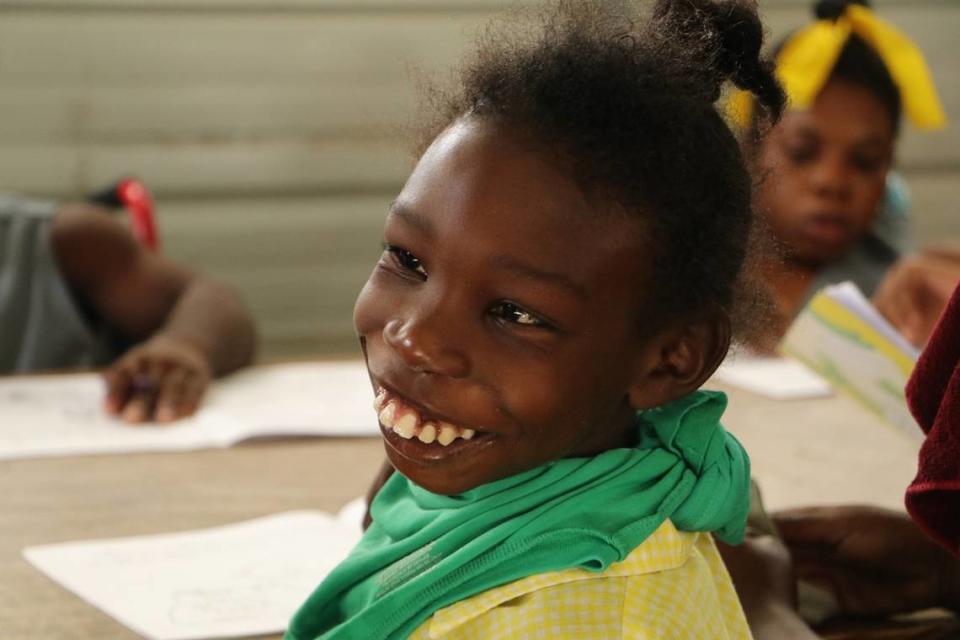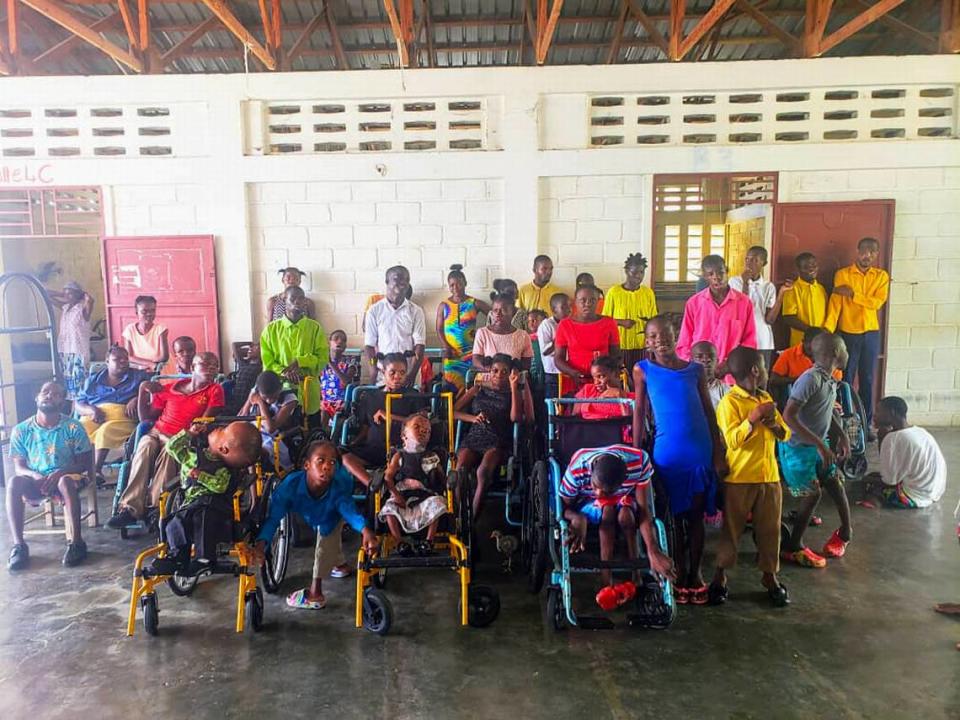Effort to move disabled Haiti kids to Jamaica meets resistance; prime minister is silent
- Oops!Something went wrong.Please try again later.
An effort to transfer dozens of disabled Haitian children to safety in Jamaica, after three died because of escalating gang violence, remains deadlocked, with the head of Haiti’s child welfare agency reprimanding the orphanage for not reporting the deaths and the prime minister remaining silent.
Arielle Jeanty Villedrouin, the director of Haiti’s Institute of Social Welfare and Research, said while she understands the HaitiChildren orphanage’s “concern for the well-being of these vulnerable children and the need to provide them with adequate medical care and protection,” she cannot support the transfer of all 62 of its disabled children to another country.
“It is inconceivable and legally inadmissible to transfer an orphanage from one country to another,” she said in a note that she shared with the Miami Herald. “It is up to the Haitian State to determine the best approach to respond to this complex situation, taking into account the protection of children and respect for national and international laws.”
In a story on Sept. 10, the Miami Herald detailed the plight of 62 disabled children and adults at HaitiChildren, an orphanage about an hour’s north of the gang-ridden capital, and the fight to temporarily house them in Jamaica, where an internationally renown Catholic charity, Mustard Seed Communities, has agreed to care for them until it is safe for them to return to Haiti.
Located in the rural town of Arcahaie on Haiti’s coast, the orphanage is at the crossroads of the territories of several heavily armed warring gangs that in recent weeks have cut off safe passage, kidnapped staff and invaded the facility, threatening to put the kids “out of their misery,” according to co-founder Susie Krabacher. An American, she has been caring for Haiti’s disabled, orphaned and abandoned children since 1994.
Three of the children died last month as they were being rushed to Bernard Mevs Hospital, an hour away in Port-au-Prince, to see a specialist about their uncontrollable seizures. Gang members blocked the road and forced the vehicle to turn back, said Krabacher, who lives in Colordo and hasn’t been able to visit the facility since March because of gang control of the roads. A fourth resident, who like the other three suffered from cerebral palsy, later died in his sleep.
Despite the dangers the kids face, Krabacher’s effort to move them to Jamaica has met with esistance, as the child welfare office chastises her for not reporting the deaths, and accuses her of lacking respect for Haitian institutions because neither she nor her staff will visit in person to discuss the issue, instead relying on emails, phone calls and letters.
“This is Haitian pride at its worst. They would rather punish me than save their own children,” said Krabacher, noting that the child welfare office itself has not sent anyone to check on the children despite insisting they are the government’s responsibility. “This is a situation in which the only reason [Prime Minister Ariel Henry] and [Villedrouin] will not let these dying children go is pride.”
Getting to the orphanage from Port-au-Prince means traveling on gang-controlled roads, including National Road No. 1, which passes by Canaan, the expansive post-earthquake settlement at the northern edge of the capital where several churchgoers were killed last month when they dared to march against a dangerous gang that calls itself “the Taliban.”
While some Haitians ontinue to make the trek, Krabacher said most of her staff refuses and she is finding it increasingly difficult to safeguard the health of the disabled children, who are among 112 kids HaitiChildren has in its care.
“Our doctors have ceased being able to come to the campus. We have only one brave doctor left as well a nurse practitioner. Out of 80 employees, we have 40 left who risk their lives tom take fishing boats to come to work at the orphanage and bring with them our supplies, medicine and food,” she said.
Villedrouin said that she was “surprised to learn” from the Herald story that several children had died.
“No official statement has been made” about the deaths to the social welfare office, she said, adding that “it is of the utmost importance that all relevant authorities are informed, as soon as possible, of such events, in order to ensure transparency, accountability and the protection of the rights of the child.”

Regarding the dead children, Krabacher said “it’s been very difficult to even get a coroner to come and bring our children to the morgue to prepare them for a proper funeral. At times the coroner will not come immediately due to the gangs blocking the road, as they did when the children died trying to reach the hospital.”
She called Villedrouin’s request for a face-to-face meeting, “unreasonable,” given the U.S. embassy’s recent warning for American citizens to leave Haiti immediately due to the ongoing gang violence and kidnappings in Port-au-Prince.
“It’s an unnecessary risk to our team. We have had eight employees kidnapped already and I will not put them in needless danger again,” Krabacher said. “We don’t have the luxury to send out remaining staff to risk their lives to come visit [Villedrouin]. She refuses to speak on the phone or do a Zoom call.”
Krabacher said since the gang crisis began escalating, she unsuccessfully tried on several occasions to reach Villedrouin as early as June “to discuss the crisis we’re experiencing and asking for help.”
Krabacher and supporters of moving the kids to Jamaica, which include Luis Moreno, a former U.S. ambassador to Jamaica and former deputy chief of missions in Haiti, have instead relied on letters and emails sent to both Henry and Villedrouin.
In an email to Villedrouin she shared with the Herald, Krabacher said: “Your children need your help now. These children need pediatrics specialists. These children need 24/7 care which we have given them their entire life until our staff has been threatened and detained trying to reach the HaitiChildren campus.”
Villedrouin acknowledges that despite her stance, if Prime Minister Henry “were to make the decision, there is nothing” she could do to keep the kids from being moved.
“But while I am head of social welfare, I have a responsibility, a mission. I cannot make a decision based on an email, or an article I read and then say, ‘Yes, I agree, they can come get them,’” Villedrouin said. “Oh my God, they would say that I am being irresponsible and the criticism I would get would be even worse.”
Henry, one of just three neurologists in Haiti, has not responded to a Herald request for comment.

The prime minister was first approached about the children’s plight in June while attending political talks in Jamaica, where both Prime Minister Andrew Holness and Foreign Minister Kamina Johnson Smith intervened on behalf of Mustard Seed Communities. A respected physician with a background in public health, Henry served in several government posts, including the health ministry, before stepping into the current job after the assassination of President Jovenel Moïse.
More than most people, Henry understands the limitations of Haiti’s broken healthcare and social welfare system, having also served as Haiti’s social affairs ministry and directing the neurosurgery program at Bernard Mevs Hospital, where he trained the physicians who care for the kids in HaitiChildren’s care.
Still, he has remained silent, acquiescing instead to Villedrouin, who has served as the head of the social welfare agency through two presidential administrations.
Villedrouin said she is open to discussing the children’s plight on a case-by-case basis. But she also told Krabacher in an email shortly after the Herald’s story published that moving the children out of the country is not necessarily the best option.
“It would also require huge commitment from the host country and organization. Furthermore, relocation outside of Haiti can also create dangerous precedents, as other orphanages may also want to move out,” Villedrouin said.
Krabacher said she has not suggested in any way that her orphanage HaitiChildren “be moved to another country, which I find unacceptable after 30 years of building and developing a suitable environment to raise special-needs and severely disabled children and young adults.”
But relocating her orphanage inside Haiti, as Villedrouin has suggested, is also not feasible, she said. Besides the financial cost, the disabled children cannot be more than an hour from a neurologist, given their medical needs, which include cerebral palsy, Down syndrome and other brain disorders.
There are also children with heart disease, Krabacher added, who need several levels of care only a specialist can provide.
Most, if not all, of those specialists are in the capital, where gangs control more than 80% of the territory.
“Is there any government facility or aid in Haiti for the disabled? No,” Krabacher said. “Every single child placed in my care by was either disabled or so sick they were not expected to live due to starvation or congenital diseases.”
The disabled kids’ plight has divided Haitians. While some support the move to Jamaica, others argue that the children should not be moved and the orphanage, like others, can be relocated. Villedrouin shared copies of several letters she said she has received from groups opposing the evacuation and supporting her stance.
One of those groups, the National Associative Network for the Integration of Disabled People, said HaitiChildren should be “relocated to another area in Haiti, such as the far north. The whole country is not affected by this wave of insecurity.”
“Unfortunately, this situation affects many other Institutions in the country. Everyone is forced to lead an unacceptable life, particularly in Port-au-Prince and its surroundings,” the group wrote to Velledrouin. “People with disabilities have the right to live and grow in their country.”
Villedrouin said her office is open and available and she invites Krabacher to come discuss the matter.
“This is not the only center that I have that have disabled children in it,” she said. “I understand that the pressure is enormous. But the pressure is harder on me than it is on them, because they are speaking about one center and I have 700-plus centers I am handling.”

